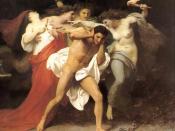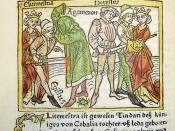Aristotelian Tragedy:
Clytemnestra's Tragic Role in The Oresteia
In Poetics, Aristotle describes a tragic hero as one of noble birth and as more admirable than ordinary men. The hero, however, cannot be morally perfect; for the best plots arise when the hero's downfall is the inevitable consequence of some defect in character. The spectacle of a good man dragged to destruction by a single error evokes feeling of pity and fear in the audience. The reaction to the hero's demise leads to "catharsis," a state through which these emotions are purged, and the audience leaves the theater relieved, rather than depressed. Although Agamemnon and Orestes display qualities of tragic heroes as set out by Aristotle, through her man-like character and her desire for vengeance, Clytemnestra better demonstrates the character traits of a tragic hero.
According to Aristotle, the tragic hero is a character of noble stature who exudes greatness.
The character must occupy a high status position but must also embody nobility and virtue as part of his or her character. Clytemnestra, upon Agamemnon's departure for the battle of Troy, takes control of city-state of Mycenae. Although Clytemnestra was not born noble, she marries Agamemnon and, in his absence, thrusts herself upon the duties of kingship. Clytemnestra's sense of duty compels her to accept the new role, demonstrating her virtue and honor. Agamemnon, on the other hand, is arrogant and prideful upon his return to Argos: "â¦the gods, they sent me, and they have brought me back. Victory, you have been my constant companion, may you stand by my side forever" (Agamemnon 852-854). Equally, Aeschylus depicts Orestes as weak when he begs for mercy from Apollo: "Lord Apollo you know how not to be unjust⦠you have the power for good, you can save me"...


